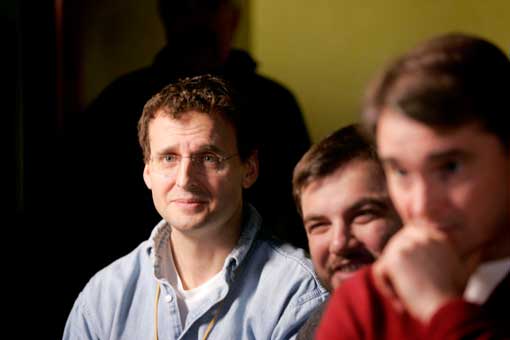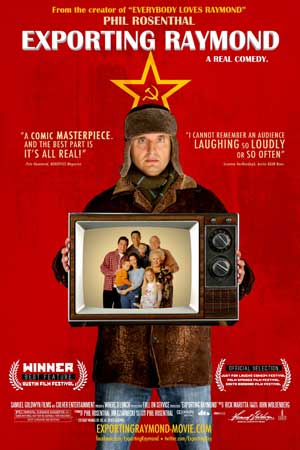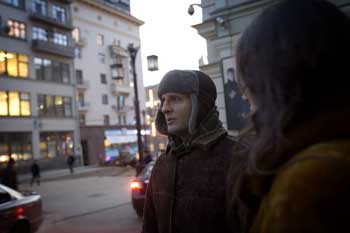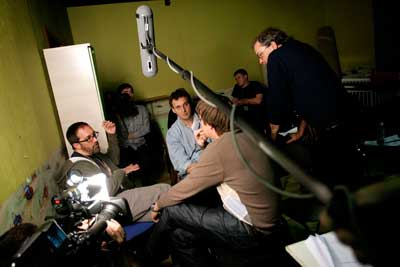
The thing I remember most from my years at CBS working on Everybody Loves Raymond is the sound of Phil Rosenthal's laugh.
The only word I can use to describe it is "joyful." If you listen carefully to most episodes of Raymond, you can hear it, winging above the dialogue. To me, this was a man who loved what he did for a living, and delighted in seeing the perfect fusion of relatable, funny stories played out by one of the best ensemble casts in television. He would stand in the shadows on the soundstage with the other writers, and chortle like an audience member, not the series' creator and executive producer. I always welcomed hearing that laugh. Who wouldn't?
In Russia, not so much.

In the new documentary Exporting Raymond, written and produced by Rosenthal, and due in select theaters this Friday (April 29), the moment of reckoning comes during a taping of the Russian version of the dysfunctional Barone family comedy that ran on CBS for nine seasons, a transfer that Rosenthal has traveled to Moscow to facilitate.
Rosenthal, despairing whether he would ever actually feel amused by the miscast actors and puzzling translations he had been watching for days, finally reacts to the gifted actor playing the Frank Barone part, by laughing. An Everybody Loves Kostya executive promptly shushes him, because apparently, no one in Russia is supposed to laugh out loud when delivered dialogue is funny. Not any of the crew, not the handful of grim-looking audience members that Rosenthal has persuaded the Russians to let watch the taping ("But we'll have to get chairs," they worried), and certainly not Rosenthal. That's what laugh tracks are for, the exec explains, and the genuinely stunned look on Rosenthal's face gives way to horror. Maybe this whole transplantation idea sold to him by Sony executives wasn't going to be so easy. "I thought I'd be welcome as the guy who created the show --Sony told me, like a foreign dignitary."
Again, not so much.
On good days, he wound up feeling like a guest. On bad days, "I felt a little scared," he says ruefully.
For Rosenthal, the problem, literally, and seemingly insurmountably, was how to translate Raymond so it would play in Russia. Rosenthal could not find a way to communicate to his Russian colleagues what he believes was the key to Raymond's success -- recognizable stories about the little things that drive families crazy and glue them together. The Russians didn't understand the heart that Rosenthal was talking about, even if he wore it on his sleeve in production meetings that quickly turned icy. The Russians saw Ray Barone as weak. They saw the little stories about nothing (like the still-packed post-vacation suitcase that will sit on the landing for days till either Ray or Debra gives in to carry it upstairs) to be incomprehensible and, as one Russian TV network honcho put it, "not funny."

Granted, as a hurt Rosenthal says in the film, he did not have to go all the way to Russia to be told Raymond wasn't funny, but at the end of this documentary, you'll be glad he did. In the first place, he concedes that perhaps his deal's K&R insurance clause -- "kidnapping and ransom" -- should have given him pause. (Any clause that boasts its own abbreviation is worrisome, he remarks.) What isn't in the film, Rosenthal told a rapt L.A. audience this week in a post-screening Q&A, is that his burly, former military man-turned-bodyguard, upon picking him up at the airport, revealed that Sony did not spring for "the gun package." Says Rosenthal: "I felt a little less secure."
Overall, he spent about six weeks in Russia, trying to help make Raymond, now re-titled The Voronins, work for everyone. For all the differences that stymied him, he was bemused by how similar television network executives were -- and not in a good way. Rosenthal's idiosyncrasies are what made Raymond tick. In Russia, those peculiarities made him a pariah. At one point, few people were talking to him, or for that matter, even looking at him -- that's how deep the divide was between what he thought they should be doing and what they wanted to do.
Ultimately, Rosenthal let go, and when he did, a sort of sitcom perestroika took place. The journey to get there is at times hilarious -- the impasses, uncomfortable, when no one can find the words to make the other understand what is not working. It is also an eye-opener to find out that an episode of the CBS show, which cost $1-2 million to make on the opulent stages at Warner Bros. with all the Hollywood perks, costs $80,000 in Russia -- an all-inclusive budget, which might explain why the unexpected cost of a few folding chairs on their spartan gulag of a set was not a joke to the Voronins producers (and in hindsight is actually quite poignant).

Some reviews have taken Rosenthal to task for being too arrogant and narcissistic to understand that the differences between cultures should be celebrated, not homogenized. But I don't think this is what Rosenthal is trying to say in Exporting Raymond. The man's not stupid, and he did not go there intending to be a stubbornly ugly American. Of course he understood that people are different, and what plays in America would not always play in Russia. What he is trying to preserve is what he believes to be the universal truth he and Ray Romano found in stories about unpacked suitcases, fruit-of-the-month-clubs, lemon chicken recipes and recorded-over wedding videos, and which he firmly believes shouldn't be lost in translation.
Whatever those moments are in the Russian family, we don't really find out, but Rosenthal believes that they must exist. He points out that the show has been dubbed in 148 countries, so it has to be relatable. And the show won 15 Emmys in its original run, so let's assume he knows something about comedy. That the Russians' first ventures into adapting American sitcoms were remakes of The Nanny and Bewitched may have been an indicator of the kind of comedy they prefer, but you can't blame a guy for trying to nudge his Moscow colleagues in another direction.
At the end of the film, a crawl explains that the transplanted Raymond became the No. 1 sitcom on Russian television.
"So they finally saw the light?" an audience member asks. Rosenthal laughs. "Of course not. I'd like to think I was a huge influence, but it was more like 'Oh, you're right, goodbye,' and then they did what they wanted to do," though, he adds, it did get better. "In Russia, real life can be terrible, so why put that on TV. They were second-guessing what the audience wants, and that kills you over here, too."
Ultimately, says Rosenthal, the show was not for him, it was for them. He adds: "There was an episode where all of a sudden a sexy nurse appears," Rosenthal relates, "like in Laugh-In. When I asked why, I was told, 'because we like them.'"